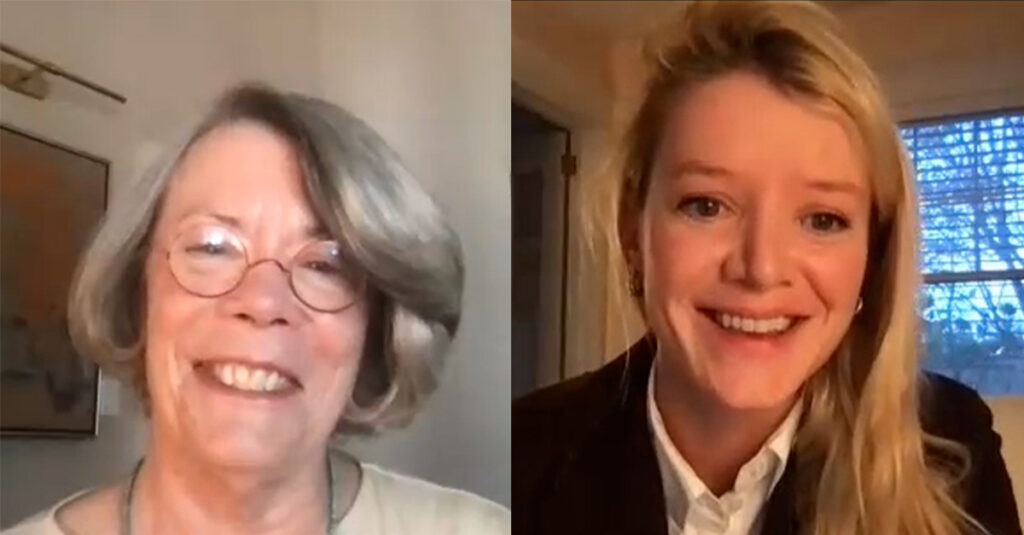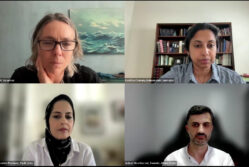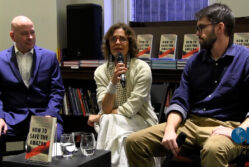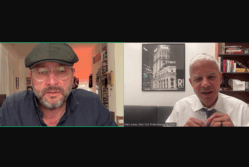Archive Event Highlight

Jane Ferguson Discusses Success and Risk in Her Career as War Correspondent
by Chad Bouchard
Award-winning international correspondent Jane Ferguson has covered some of the world’s most violent conflict zones over the last decade and a half, from the Middle East and Arab world to East Africa and South Asia, reporting for CNN, PBS Newshour, Al Jazeera English and The New Yorker. But as a professor of journalism at Princeton, she started to notice reverence among students and wanted to demystify her work.
“I could see in their faces that they thought I had it all figured out, that it had been this great smooth ascent, and ‘look at her career, she must be special. She must have some sort of magical quality,” she said. Ferguson thought of those students when she set out to write her recently published memoir, No Ordinary Assignment, which depicts an honest picture of mistakes and shortcomings in her career and realities of conflict reporting, as well as her successes.
“I wanted them to see that I had faced a lot of rejection, I had made a fool of myself at times, I had almost gotten myself killed.”
On Oct. 19, Ferguson joined an OPC program to discuss the book, with Elizabeth Becker, an award-winning correspondent and author whose career spans four decades, including coverage of Cambodia during the Vietnam War.
Ferguson told Becker she first dreamed of becoming a foreign correspondent during a turbulent childhood on a farm in Northern Ireland during the final years of the Troubles. She and her three siblings were often sent to live with relatives for weekends and summers, including one particularly influential honorary “aunt” Fanny, a friend of the family, who Ferguson said was a “life mentor.”
“She would show me love, she taught me to play Scrabble, she taught me to write letters, she encouraged me to read, she talked to me about the wider world.”
Ferguson said Fanny wrote to her at a key moment just after she finished college, and included a £3,000 check to be used for something “fun.” She spent that money on a ticket to Yemen where she studied Arabic, a move that started her on a path to achieve her childhood dreams.
She later worked in Dubai, and then flew to Afghanistan to begin reporting as a freelancer in 2009. One of the first interviews Ferguson conducted in Kabul was with British photographer Tim Page, a friend of Becker’s and a renowned photographer who covered the Vietnam War. When he noted the lack of depth of understanding among Western journalists in Afghanistan, she recognized that critique in herself.
“I took it very much to heart. It really followed me. Everything he told me that day as a youngster proved right throughout every conflict zone I ended up in.”
Her career took her to Somalia, Sudan and back to Yemen during the Arab Spring, where she reported regularly on conflicts for CNN, and then to Syria to report for Al Jazeera. Ferguson said she looked for under-covered conflicts and places where traditional media were still reluctant to send their staff teams.
“I was trying to fill in the cracks where the coverage wasn’t there,” she said. “That’s really where I started to learn how to find work – but also work that I loved, because it feels like you’re doing the most additive work. If you go somewhere where other people aren’t, your work can have more impact.”
In Syria, as she was being smuggled into rebel-held Homs, she said for the first time she felt she had “bitten off more than I can chew.”
“I’m really spooked the whole time I’m there. I’m afraid for three days. I’m absolutely petrified,” she said. Ferguson left after a few days, cutting the trip short, having filmed enough for her Al Jazeera assignment. Her work had scooped a lot of networks and was a pivotal moment in her career, “but I scared the life out of myself.”
“It was one of those moments when I realized that courage is not enough. This was quite stupid, and I probably wouldn’t put myself in that position again,” she said.
Only one week later, American journalist Marie Colvin was killed during an attack while covering the Siege of Homs.
Ferguson said she is uncomfortable with the way people lionize conflict journalists.
“We walk a tightrope between purpose and ambition. I‘ve always questioned myself – am I doing this because of my career, or am I doing this because it’s important and I’m the person who can get it done? Is this service or is this ambition?”
Ferguson and Becker also discussed the current war in Gaza, where she previously reported, including thoughts on current media coverage, the killing of journalists, the targeting of civilians and other war crimes in the conflict.
She said violence in Gaza is one of the trickiest and most emotionally charged stories in the world to cover. Ferguson encourages her students and colleagues to think about international humanitarian law as context for the reporting.
“If we can have any line in the sand, when morality is moving and swirling around, what we need to talk about is – what is legal? Because effectively what we’re talking about is what’s held up as human decency, globally.”
Ferguson was part of the PBS Newshour team that won the OPC’s 2021 Peter Jennings Award for covering the fall of Kabul and was also part of the PBS team that won a 2015 Citation for Excellence in the Edward R. Murrow Award category for reporting in Iraq. Her work has also garnered a George Polk Award, an Emmy Award, and an Alfred I. DuPont-Columbia Award, as well as a nomination for a Peabody Award and shortlisted for a Livingston Award.
Becker is author of You Don’t Belong Here, the story of three extraordinary female journalists who crossed official and cultural barriers for women covering war. She has reported for The Washington Post, National Public Radio and The New York Times. Becker is also the author of When the War Was Over: Cambodia and the Khmer Rouge Revolution; and Overbooked: The Exploding Business of Travel and Tourism.
No Ordinary Assignment is available for purchase here.
Click the window below to watch a playlist of video clips from the program.




